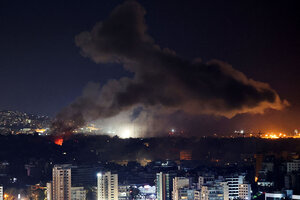As Mideast emotions run high, is there room for restraint?

Smoke rises over Beirut's southern suburbs after a strike, amid ongoing hostilities between Hezbollah and Israeli forces, as seen from Sin El Fil, Lebanon, Oct. 3, 2024.
Amr Abdallah Dalsh/Reuters
London
In Israel Thursday night, in Iran, and in Hezbollah’s bunkered hideaways in Lebanon, rival commanders will be poring over plans that could trigger the worst Middle East conflict in decades.
But if they do pull back from the brink, it will be because they are also reminding themselves of a trio of sobering truths about their battle-scarred region.
Firstly, that in the Mideast, especially along Israel’s northern border with Lebanon, small wars have had a nasty habit of becoming far larger ones.
Why We Wrote This
The Middle East may be on the brink of full-scale war, but past experience teaches both Israel and Iran that wars in this region rarely go as planned. Might bad memories be enough to hold them back?
Secondly, starting wars has proved to be a lot easier than ending them.
And thirdly, stability, if not full peace, has almost always been achieved not on the battlefield but through diplomacy.
The question for a nervously watching world, above all for the Biden administration, is whether these lessons will give Israel and its enemies sufficient pause to slow the rapid Mideast escalation of recent days.
Above all, the world’s eyes are on the Israelis.
That’s not because they are wholly responsible for the increased tensions. That spiral began a year ago when Iran-backed Hamas fighters poured across Israel’s southern border from Gaza, murdering and abducting more than a thousand men, women, and children.
It’s because of the train of events since then, most recently Israel’s new focus on Iran’s main regional surrogate, Hezbollah. Its forces began firing into northern Israel the day after Hamas’ attack, driving some 65,000 Israelis from their homes.
Over the past two weeks, Israel has set off explosions inside pagers and walkie-talkies used by Hezbollah in Lebanon. It has assassinated the group’s leader, Hassan Nasrallah, and several top commanders, along with a senior Iranian military figure visiting Beirut.
Then, in the early hours of Tuesday, Israel sent ground forces into Lebanon to attack Hezbollah positions.
And hours later, Iran launched the most powerful missile attack against Israel in its history.
The issue now is what Israel will do next.
Israeli leaders have vowed to respond. How and when they do so will go a long way to determining whether the region’s two main military powers end up in an all-out war.
The Israelis are fully aware of the time-proven pitfalls of waging Mideast wars.
There were signs, at least until Iran’s missile attack, that they were keeping those risks in mind as they planned their latest major push into Lebanon – their fourth since the late 1970s.
Only the first one, lasting a week in 1978, came near to achieving its declared aim. Longer, larger invasions in 1982 and 2006 caused huge destruction, and casualties on both sides. They also left behind the incomparably more powerful Hezbollah that Israel is now seeking to defeat.
In announcing the latest incursion, Israel said it would be a “targeted and limited” operation.
Still, unlike the 1978 incursion, whose explicit aims were to deliver a short, sharp response to a terror attack inside Israel and to clear a border strip of rocket-firing positions, there is no indication this time of precisely what Israel wants to achieve, nor of how long it is planning to stay.
Nor has there been any clear signal so far of what kind of response to Iran’s unprecedented missile barrage Israel is contemplating.
Ever since the Hamas attack, the fear in Washington has been that, however aware the rival forces were of the “trio of truths” about Mideast wars, raw emotion might overwhelm reasoned restraint.
So far, that hasn’t happened.
But for many Israelis, a new factor has been gaining traction in the past few days.
It’s a belief that their stunning recent successes against Hezbollah have given them a unique opportunity to completely remove the threat the group poses and also deal a crushing blow to Iran.
Former Israeli Prime Minister Naftali Bennett captured that mood when responding to Iran’s missile attack. He said Israel now had “its greatest opportunity in 50 years to change the face of the Middle East.” He urged the government to target Iran’s nuclear program and its energy infrastructure and to “fatally cripple” the regime.
Whether the current prime minister, Benjamin Netanyahu, chooses that path will doubtless become clearer in the next few days.
But the memories of past Lebanon invasions – two in particular – could also weigh on his mind.
The 1978 incursion was not only short and sharp. It had a well-defined diplomatic endgame: the creation, negotiated with Lebanese government support, of a United Nations buffer force in southern Lebanon.
The 1982 war was nearer in conception to the kind of counterstrike Mr. Bennett is advocating.
Crafted by then-Defense Minister Ariel Sharon, it was a full-scale invasion in which Israeli forces ended up besieging, bombarding, and entering the capital, Beirut.
It, too, aimed to “change the face of the Middle East,” by expelling Yasser Arafat’s Palestine Liberation Organization and installing a Lebanese Christian ally, Bashir Gemayel, as president.
It ended with Mr. Gemayel’s assassination, his supporters’ rampage against defenseless Palestinians in the Beirut refugee camps of Sabra and Shatila, and a 20-year Israeli occupation of a “security zone” in southern Lebanon.
And it had another, unanticipated after-effect: the emergence of an unprecedentedly powerful Lebanese Shiite militia, backed by Iran, inside Lebanon.
Hezbollah.


